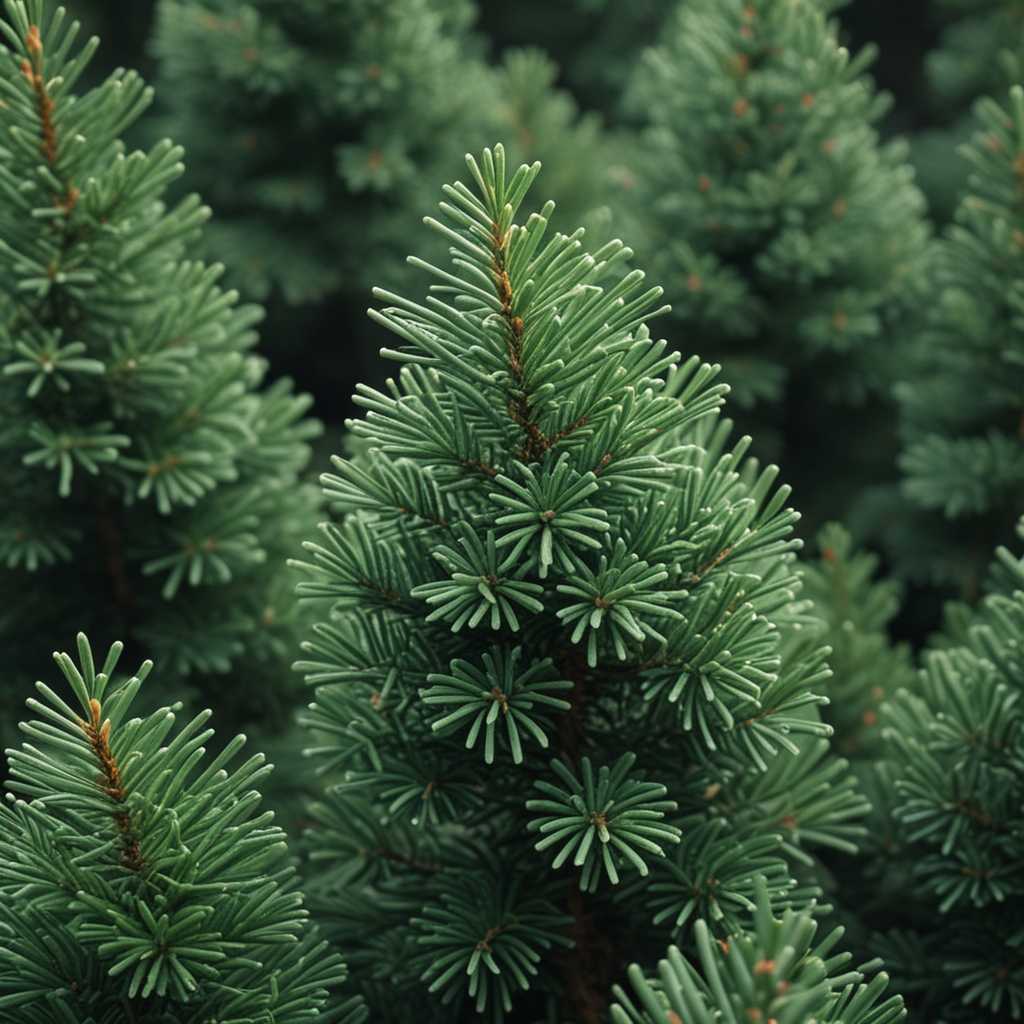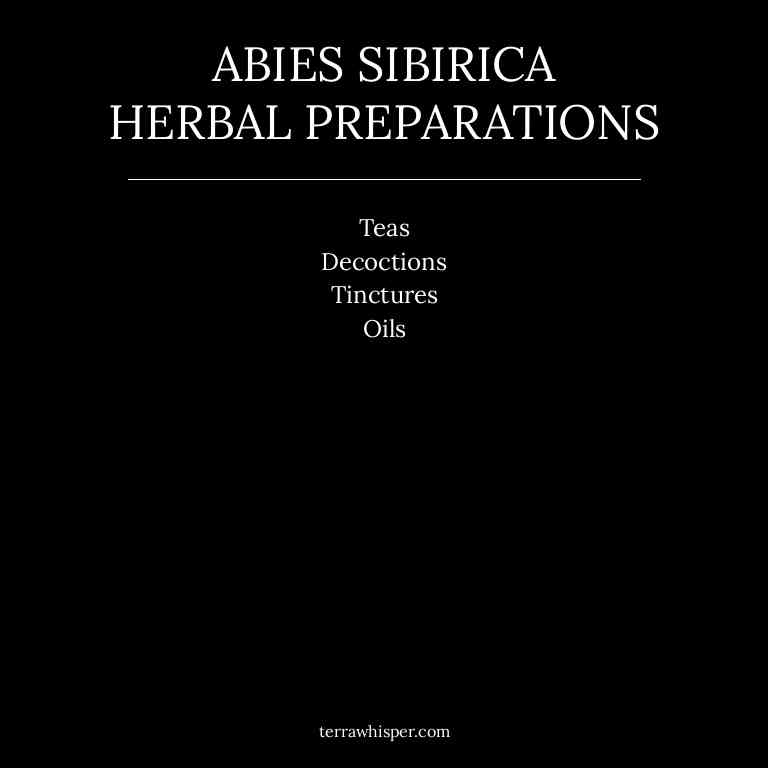Abies Sibirica Uses, Benefits, And Remedies

Abies sibirica, commonly known as Siberian fir, is a coniferous tree native to the mountainous regions of Eastern Europe and Asia, whose needles and bark are used in traditional herbal medicine.
This herb is valued for its potential to support respiratory health, reduce inflammation, and enhance immune function.
The bioactive constituents in Abies sibirica include flavonoids, phenolic acids, and essential oils, which contribute to its antioxidant and anti-inflammatory properties.
Herbal preparations such as infusions, tinctures, and decoctions can be made from the dried needles and bark to harness its therapeutic benefits.
This page analize the most important medicinal aspects of Abies sibirica.
- Health Benefits
- Bioactive Constituents
- Medicinal Parts
- Herbal Preparations
- Side Effects of abies sibirica
Health Benefits
Abies sibirica treats respiratory issues due to its high concentration of bioactive compounds like essential oils and flavonoids, which help reduce inflammation in the airways and loosen mucus, making it effective for conditions like bronchitis and asthma.
It fights against infections by containing antimicrobial and antiviral properties that inhibit the growth of bacteria and viruses, thereby supporting the body's natural defense mechanisms. Abies sibirica boosts antioxidant levels by providing compounds such as phenolic acids and terpenes that neutralize free radicals and reduce oxidative stress in the body. It heals inflammation by modulating inflammatory pathways through its anti-inflammatory compounds, which can alleviate symptoms in conditions like arthritis and skin irritations.
It improves the immune system by stimulating the production of white blood cells and enhancing the body's ability to fight off pathogens and recover from illnesses.
The 10 best health benefits of Abies sibirica are shown in the image below.

The list below give a brief description of the 10 best health benefits of Abies sibirica.
- Treats Respiratory Issues: Abies sibirica herb is known to help alleviate symptoms of respiratory conditions such as coughs, bronchitis, and asthma due to its anti-inflammatory and decongestant properties.
- Fights Against Infections: The herb contains natural antimicrobial compounds that help combat bacterial and viral infections, supporting the body's defense mechanisms.
- Boosts Antioxidant Levels: Abies sibirica is rich in antioxidants that neutralize free radicals, reducing oxidative stress and promoting overall cellular health.
- Heals Inflammation: The herb possesses anti-inflammatory properties that can help reduce inflammation in various parts of the body, including joints and the respiratory system.
- Improves Immune System: Regular use of Abies sibirica can enhance immune function by stimulating the production of white blood cells and other immune-related compounds.
- Treats Arthritis Pain: The herb's anti-inflammatory and analgesic properties make it effective in reducing pain and swelling associated with arthritis.
- Helps In Wound Healing: Abies sibirica promotes tissue repair and regeneration, making it useful in the healing process of wounds and skin injuries.
- Relieves Mental Fatigue: The herb is believed to have calming effects that can help reduce mental fatigue and improve cognitive function.
- Supports Healthy Bones: Abies sibirica contains compounds that may contribute to maintaining bone density and strength, supporting skeletal health.
- Reduces Stress Levels: The herb has adaptogenic properties that help the body manage stress, promoting a sense of calm and balance.
Bioactive Constituents
Abies sibirica α-pinene is a prominent monoterpene found in the essential oils of this coniferous plant, known for its potent anti-inflammatory and antimicrobial properties.
This compound is widely used in traditional medicine for its ability to alleviate respiratory conditions such as bronchitis and asthma due to its bronchodilatory effects. In addition to α-pinene, Abies sibirica contains β-pinene, another monoterpene that exhibits similar therapeutic benefits, including antifungal and analgesic properties.
The herb also contains limonene, a compound known for its antioxidant and anti-cancer potential, which contributes to the overall health benefits of the plant. Furthermore, Abies sibirica is rich in polyphenols, which are powerful antioxidants that help protect cells from oxidative stress and support immune function.
These medicinal constituents collectively make Abies sibirica a valuable resource in natural medicine, offering a range of health benefits from respiratory support to immune enhancement.
The 13 best bioactive constituents of Abies sibirica are shown in the image below.

The list below give a brief description of the 10 best bioactive constituents of Abies sibirica.
- Α-Pinene: A monoterpene with anti-inflammatory and antimicrobial properties, commonly found in coniferous resins.
- Limonene: A terpene with antioxidant and anti-cancer properties, known for its citrus scent and potential to support digestive health.
- Polyphenols: A group of natural compounds with strong antioxidant properties that help protect cells from damage and reduce inflammation.
- Β-Pinene: A monoterpene with anti-inflammatory, antispasmodic, and analgesic properties, often used in aromatherapy.
- Sesquiterpenes: A class of terpenes with anti-inflammatory, antimicrobial, and immunomodulatory effects, often found in essential oils.
- Β-Caryophyllene: A sesquiterpene with anti-inflammatory and analgesic properties, also known for its ability to interact with cannabinoid receptors.
- Flavonoids: A group of plant-based compounds with antioxidant, anti-inflammatory, and neuroprotective properties.
- Sabinene: A monoterpene with antimicrobial, antifungal, and anti-inflammatory properties, often used in essential oils.
- Triterpenoids: A class of organic compounds with diverse biological activities, including anti-inflammatory, antiviral, and immunomodulatory effects.
- Phenolic Acids: A group of compounds with strong antioxidant properties, known for their ability to neutralize free radicals and reduce oxidative stress.
- Bornyl Acetate: A monoterpene ester with antifungal, antibacterial, and anti-inflammatory properties, commonly used in aromatherapy.
- Β-Terpineol: A cyclic monoterpene alcohol with antimicrobial, antifungal, and anti-inflammatory properties, often found in essential oils.
- Sterols: A group of compounds with anti-inflammatory and immunomodulatory effects, often used in skin care and medicinal applications.
Medicinal Parts
Abies sibirica leaf has been traditionally used in herbal medicine for its potential therapeutic properties.
The leaves contain various bioactive compounds, including flavonoids and essential oils, which may contribute to their medicinal value. These compounds are believed to possess anti-inflammatory, antimicrobial, and antioxidant properties, making the leaves useful in treating respiratory conditions and skin ailments. In traditional practices, the leaves are often dried and used to make teas or poultices.
However, the extent of their pharmacological effects is still under investigation, and more scientific research is needed to validate their traditional uses.
Herbal Preparations
Abies sibirica teas are commonly prepared by steeping the dried needles or cones of the Siberian fir in hot water, often used for their calming and respiratory benefits.
These teas are valued for their potential to soothe coughs, reduce inflammation, and support overall respiratory health. The preparation method involves using fresh or dried plant material, which is simmered or steeped for several minutes to extract the active compounds. In traditional medicine, Abies sibirica decoctions are also popular, where the plant is boiled for a longer period to release more potent medicinal properties.
Tinctures made from Abies sibirica are created by soaking the plant material in alcohol or glycerin, allowing for a concentrated form that can be taken in smaller doses. These tinctures are often used for their antiseptic and anti-inflammatory effects. Additionally, essential oils extracted from the needles of Abies sibirica are utilized in aromatherapy and topical applications for their refreshing and invigorating properties.
Each preparation method highlights the versatility of this herb in herbal medicine, offering different ways to harness its therapeutic potential.
The 10 best herbal preparations of Abies sibirica are shown in the image below.

The list below give a brief description of the 10 best herbal preparations of Abies sibirica.
- Teas: Abies sibirica tea is used to support respiratory health, soothe coughs, and alleviate symptoms of colds and bronchitis due to its expectorant and anti-inflammatory properties.
- Decoctions: Abies sibirica decoctions are valued for their ability to enhance circulation, reduce inflammation, and support joint health, often used in traditional medicine for arthritis and rheumatic conditions.
- Tinctures: Abies sibirica tinctures are utilized for their stimulating and warming effects, helping to improve circulation, relieve muscle pain, and support the immune system.
- Oils: Abies sibirica oils are applied topically to treat skin conditions, reduce inflammation, and promote wound healing, often used in aromatherapy and massage for their soothing and antiseptic properties.
Side Effects of abies sibirica
Abies sibirica triggers respiratory issue in individuals who are sensitive to its compounds, leading to symptoms such as coughing, wheezing, and shortness of breath.
The herb can also trigger skin rash and result in skin itching, causing discomfort and redness on the affected areas. Prolonged exposure may cause skin irritation, which can range from mild redness to more severe inflammation.
Additionally, Abies sibirica may promote throat swelling, potentially leading to difficulty swallowing or breathing, which requires immediate medical attention. It can also induce allergic reactions, including nasal congestion and, in severe cases, anaphylaxis. These side effects highlight the importance of caution when using this herb, especially for individuals with a history of allergies or respiratory conditions.
It is advisable to consult a healthcare professional before incorporating Abies sibirica into any health regimen to minimize the risk of adverse effects.
The 7 most common side effects of Abies sibirica are shown in the image below.

The list below give a brief description of the 7 most common side effects of Abies sibirica.
- Triggers Respiratory Issue: May cause difficulty in breathing, coughing, or wheezing due to irritation of the airways.
- Triggers Skin Rash: Can lead to an itchy, red, and raised skin rash as a reaction to the herb's compounds.
- Results In Skin Itching: May cause an uncomfortable tingling or scratching sensation on the skin.
- Causes Skin Irritation: May result in redness, dryness, or inflammation of the skin upon contact.
- Promotes Throat Swelling: Can lead to inflammation and swelling of the throat, potentially causing difficulty in swallowing.
- Induces Allergic Reaction: May trigger an immune response leading to symptoms like hives, swelling, or anaphylaxis in sensitive individuals.
- Causes Nasal Congestion: May lead to a stuffy or blocked nose due to inflammation of the nasal passages.